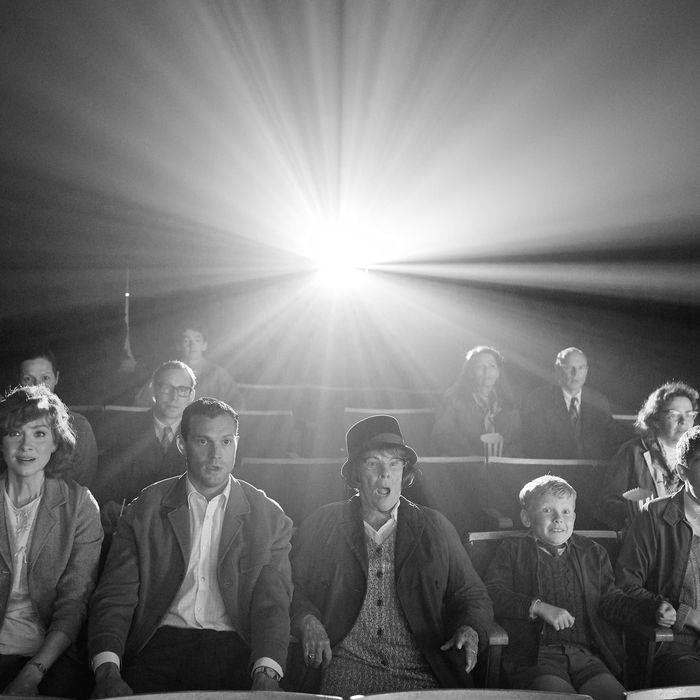
It would be natural to expect something grittier, darker, more incendiary from a film called Belfast and set in Northern Ireland in 1969. In some ways, that’s the most striking — and perhaps even most political — fact about Kenneth Branagh’s autobiographical tale, which is less about the horrors of war than it is about the everyday lives that such horrors eventually crowd out. It’s a necessary re-orientation toward humanity, even when it occasionally falters.
The factional violence that would eventually consume Northern Ireland makes an early appearance in Belfast, as the film’s young protagonist, nine-year-old Buddy (Jude Hill), finds a fairly ordinary day turned into flaming chaos as a riot spills into his neighborhood. One minute he’s fighting imaginary dragons using a trashcan lid as a shield, the next his terrified mother (Caitríona Balfe) is using that same lid as a real shield, to protect herself and her child as she attempts to carry him back home to safety amid showers of shattered glass and Molotov cocktails.
That’s not the only transformation that happens. Before this brief early burst of fighting starts, Branagh films the busy street in elaborate, swooping long takes that show neighbors greeting one another, joking around with Buddy and others. Their interactions are heightened, not particularly naturalistic — maybe even a little theatrical, like the opening of a play that’s trying to quickly recreate the bustle of real life on a stage. It’s a brief, stylized portrait of the goodwill that will soon evaporate from this block to which much of the film is confined. Later, we see some of these neighbors turn on each other. We see the young girl the greengrocer greets try and loot that very same store. We see the women who watch out for Buddy’s well-being spread rumors about his mom. Buddy’s family are Protestants, and soon their fellow Protestants are demanding that they turn on their Catholic neighbors. Sectarian strife is so often presented in historical narratives as something that reaches down through the centuries; Branagh, it seems, wants to remind us that the truth is not so neat and reductive, that people by and large like to get along.
Despite this early bit of unrest, the focus throughout Belfast remains on more mundane matters — on the less dramatic challenges of life. Buddy’s father (Jamie Dornan) is a carpenter working temporary construction jobs in England and is away much of the time, leaving mom to hold down the fort. He and his wife are mired in debt, which they’ve been diligently trying to pay off. Buddy’s grandfather (Ciarán Hinds) is having health problems, probably due to all the time he spent in the coal mines. Buddy has a crush on a girl. He’s obsessed with the moon landing. He discovers movies and theater. He’s living a magical life that kids somehow manage to live even in the most dangerous circumstances (thanks, often, to the protective efforts of their parents). When mom and dad discuss leaving Belfast, he screams that he doesn’t want to go. It is his home, after all.
We see most of this in glimpses, and Branagh rarely dwells too much on any one scene or plot point. That can make the film feel diffuse at times, and it could threaten to make it all a bit too insubstantial. But Branagh wisely gives the movie the quality of a childhood memory, of stolen moments and eavesdropped conversations. As a director, he has always been an underrated stylist. His early work was marked by an awestruck expressionism, and what made his best Shakespearean films so special was that he didn’t shy away from the inherent epic grandeur of the material; he ran with it, at times even dared to enhance it. What’s most exciting about Belfast is the return of that Kenneth Branagh, a filmmaker who once sought to astonish us, before he left for the anonymity of the franchise movie salt mines.
Or at least it’s the return of a version of him. Branagh isn’t so stentorian this time around. He’ll still deliver the off-kilter camera angles and the long takes, but he also keeps things bouncing along. The thundering music of his regular collaborator Patrick Doyle has been replaced here by a series of lovely, bluesy Van Morrison songs. When things do slow down in Belfast, it’s usually to let the actors breathe. Because the rest of the film is so light on its feet, when it settles down to a quiet shot of Balfe in tears, or an extended reverie from Hinds and Judi Dench (who plays Buddy’s grandma) about the early days of their relationship, the effects are devastating.
Some will surely find this general approach lacking in context or dramatic weight. And it’s true that Branagh isn’t a formalist on the order of Terence Davies, or the Alfonso Cuarón who made Roma (a film to which this one will probably be unfairly compared). Sometimes, his light touch can work against the film. A late scene, currently making the rounds, of Dornan’s character singing along to “Everlasting Love” while Balfe dances feels like a missed opportunity: Branagh cuts so rapidly throughout that he stomps on Dornan’s big moment and drains something that should be cathartic of much of its power. But the movie overall is so winning that even such overcorrections feel like minor problems. It would have been easier, and certainly more opportunistic, to go in the opposite direction and drown us in tales of woe and victimhood. There is something genuinely bold in giving a movie about Belfast in 1969 the warm glow of the everyday. It reminds us that life goes on.
More Movie Reviews
"movie" - Google News
November 13, 2021 at 06:00AM
https://ift.tt/3kynJr3
Kenneth Branagh’s Belfast Is a Bolder Movie Than It Seems - Vulture
"movie" - Google News
https://ift.tt/35pMQUg
https://ift.tt/3fb7bBl
Bagikan Berita Ini














0 Response to "Kenneth Branagh’s Belfast Is a Bolder Movie Than It Seems - Vulture"
Post a Comment